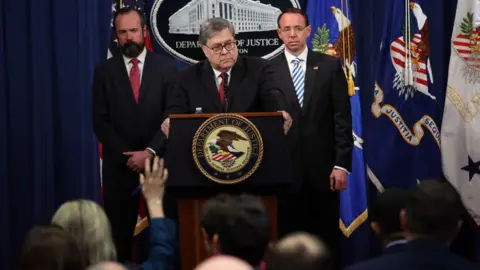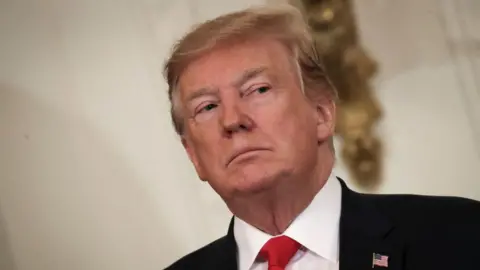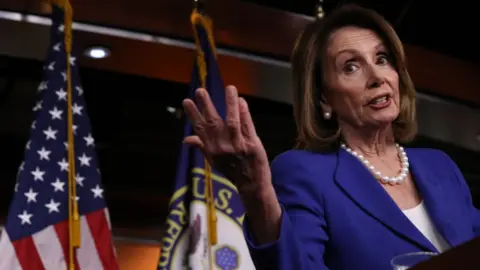Mueller report: A president saved from himself
 Getty/Win McNamee
Getty/Win McNameeLengthy reports on politics tend to be as dry as dust; a perfect cure for insomniacs; a turn on for political obsessives and a total turn-off for those with normal lives to lead. "Sorry darling, I can't come in for dinner now I'm reading appendix 6, paragraph 4 subsection 2 of this really gripping report."
Well my friends, the Mueller report really is a page turner, full of juicy revelations and intriguing titbits of palace intrigue. Its portrayal of life inside the West Wing a couple of years back is riveting. It is a place teetering out of control, with a succession of top advisers choosing to ignore the wishes of an increasingly angry president. There are so many fantastic vignettes.
But the report wasn't meant to entertain the American people - though it does, or would do if anyone chose to read it. It was meant to inform them on two key questions - whether there was collusion between the Russians and the Trump campaign - Mueller finds there wasn't. And whether the president obstructed justice in trying to impede investigation of the Russia question - on that he is a good deal more nuanced - he found 10 separate incidents where there might have been.
And it is here we come to my key question, which is ultimately political and not legalistic - will it change any minds?
 Getty/Drew Angerer
Getty/Drew AngererI suspect that if you are a Trump supporter you will say: "There was no action of illegality, the president was right all along, it's all been a hoax and a witch hunt, there's nothing to see ladies and gentlemen so please move along."
If you are someone who believes that Donald Trump was always unfit to hold office, you were reaffirmed in that view and say: "Is the bar really being set at a level where - provided nothing illegal happened - well that's alright then?"
So those are the two polarised positions.
Congress will certainly want to look much further at this, given all the revealing tales of politics at the White House.
And on this key question of obstruction of justice, I think the key quote is this: Mr Trump's attempts at influencing the investigation "were mostly unsuccessful but that is largely because the persons who surrounded the president declined to carry out orders or accede to his requests".
In other words, it looks like the team that muttered under their collective breath "I'm ignoring you, Mr President", saved him from himself.
If they had carried out his orders to arrange for the firing of Mueller then the obstruction of justice piece might be a lot clearer - and not in a way that Mr Trump would want.
So where does this leave Special Counsel Bob Mueller? The former FBI director and Vietnam War veteran may face some tough questions when he goes before that congressional committee.
He has said that the written answers provided by Mr Trump were inadequate, but if that's the case, why didn't he use his subpoena powers to demand the president come before his investigating committee and answer questions directly?
That was an arm wrestle that Mr Mueller chose not to get into with the president for fear that it may lead to the permanent death of his investigation.
So he ducked that one.
Others may ask: "Well, if you thought there was a level of obstruction why didn't you say there should be an indictment?"
I'd say what he's done here - to use an American analogy - is he's taken the baseball bat, he's put it on home plate and he's leaving it for other people to pick up and take a swing.
He's saying to Congress essentially: "I've looked at it. I didn't resolve this question. I didn't exonerate him. But if you want to have a go, that's a different thing."
Remember there are different legal thresholds for indictment (ie a criminal charge) and an impeachment which is a largely political process that would have to be done by a divided Congress.
 Getty/Win McNamee
Getty/Win McNameeBefore he goes before Congress he'll need to be able to answer this key question: "You dodged the question and didn't resolve what you were meant to resolve".
I think that the wider game - (maybe that's too glib a word to use, so I'll say strategy here) - the wider strategy of the Democrats is that they would like to see a president going into 2020 a bit wounded, a bit weakened, his name tarnished by the Mueller investigation and who will be easier to strike out in a presidential election.
The danger of going down the impeachment route, which is the most dramatic way of picking up that baseball bat, is that all that it results in is uniting the Republican party. Just look at Bill Clinton's approval ratings after Republicans impeached him. If he had been able to stand for a re-election, he would have romped home according to the polls at the time.
Then as now it would probably lead to a good many independent voters thinking: "This is all becoming ghastly and political, mean-minded, mean-spirited and nothing to do with justice, but only about political point scoring."
For that reason I think the Democratic leadership - for all the subpoenas, for all the demands for people and papers to be served up to the various committees - would much rather knock the president around a bit than go down a route which would almost certainly end in failure and almost certainly be counter-productive.
And for all the questions, doubts, contradictions, sleights of hand, Mr Trump emerges with two key headlines: Mueller says there was no collusion; the Attorney General says there was no obstruction of justice.
Game over, as Donald Trump declared on Twitter.
No wonder the White House are describing the president as "jacked".
